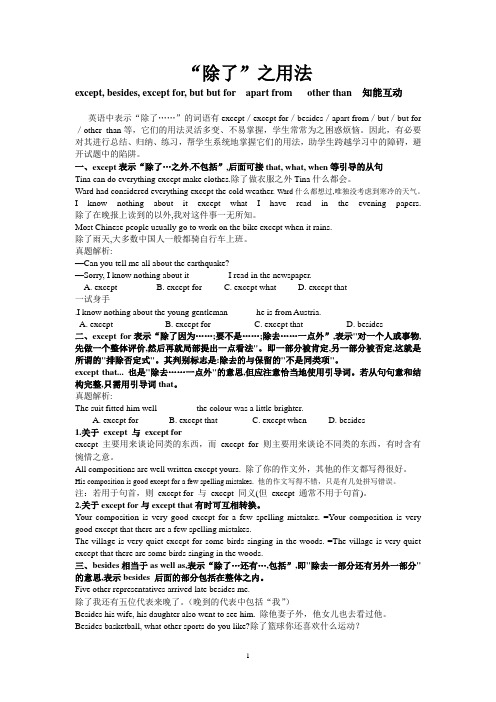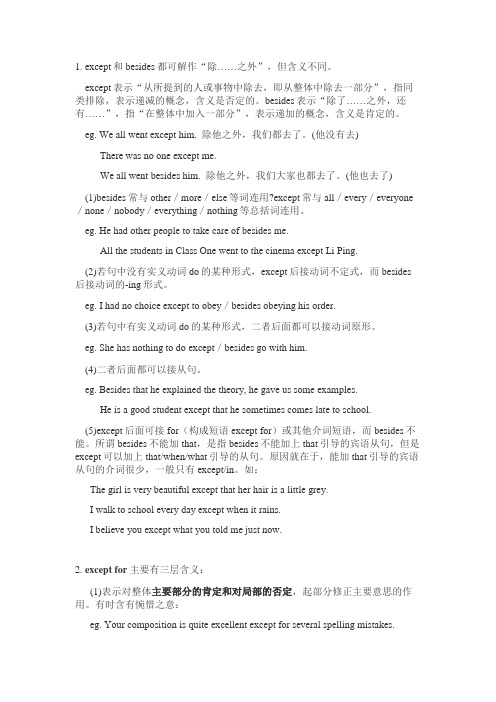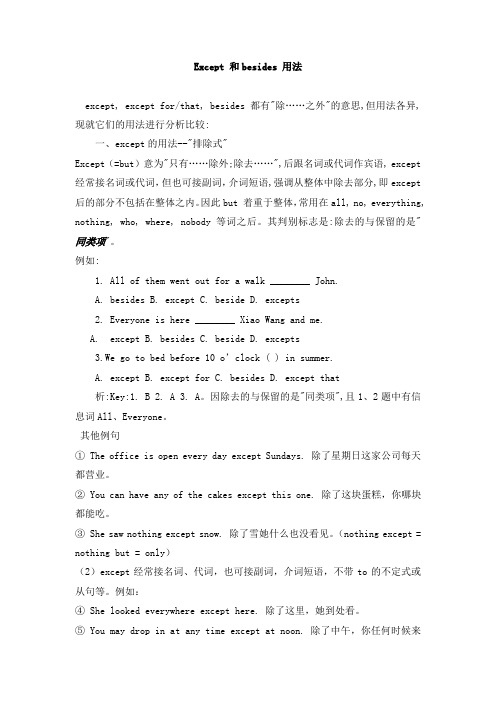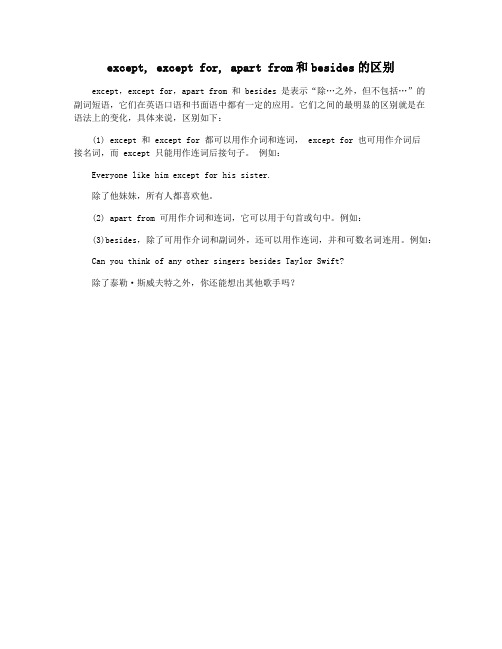Except 和besides 用法
- 格式:doc
- 大小:34.50 KB
- 文档页数:3

“除了”之用法except, besides, except for, but but for apart from other than 知能互动英语中表示“除了……”的词语有except/except for/besides/apart from/but/but for /other than等,它们的用法灵活多变、不易掌握,学生常常为之困惑烦恼。
因此,有必要对其进行总结、归纳、练习,帮学生系统地掌握它们的用法,助学生跨越学习中的障碍,避开试题中的陷阱。
一、except表示“除了…之外,不包括”,后面可接that, what, when等引导的从句Tina can do everything except make clothes.除了做衣服之外Tina什么都会。
Ward had considered everything except the cold weather. Ward什么都想过,唯独没考虑到寒冷的天气。
I know nothing about it except what I have read in the evening papers. 除了在晚报上读到的以外,我对这件事一无所知。
Most Chinese people usually go to work on the bike except when it rains.除了雨天,大多数中国人一般都骑自行车上班。
真题解析:—Can you tell me all about the earthquake?—Sorry, I know nothing about it ________ I read in the newspaper.A. exceptB. except forC. except whatD. except that一试身手.I know nothing about the young gentleman ______he is from Austria.A. exceptB. except forC. except thatD. besides二、except for表示“除了因为……;要不是……;除去……一点外”,表示"对一个人或事物,先做一个整体评价,然后再就局部提出一点看法"。

1. except和besides都可解作“除……之外”,但含义不同。
except表示“从所提到的人或事物中除去,即从整体中除去一部分”,指同类排除,表示递减的概念,含义是否定的。
besides表示“除了……之外,还有……”,指“在整体中加入一部分”,表示递加的概念,含义是肯定的。
eg. We all went except him. 除他之外,我们都去了。
(他没有去) There was no one except me.We all went besides him. 除他之外,我们大家也都去了。
(他也去了)(1)besides常与other/more/else等词连用?except常与all/every/everyone /none/nobody/everything/nothing等总括词连用。
eg. He had other people to take care of besides me.All the students in Class One went to the cinema except Li Ping.(2)若句中没有实义动词do的某种形式,except后接动词不定式,而besides 后接动词的-ing形式。
eg. I had no choice except to obey/besides obeying his order.(3)若句中有实义动词do的某种形式,二者后面都可以接动词原形。
eg. She has nothing to do except/besides go with him.(4)二者后面都可以接从句。
eg. Besides that he explained the theory, he gave us some examples.He is a good student except that he sometimes comes late to school.(5)except后面可接for(构成短语except for)或其他介词短语,而besides不能。

Except 和besides 用法except, except for/that, besides都有"除……之外"的意思,但用法各异,现就它们的用法进行分析比较:一、except的用法--"排除式"Except(=but)意为"只有……除外;除去……",后跟名词或代词作宾语, except 经常接名词或代词,但也可接副词,介词短语,强调从整体中除去部分,即except 后的部分不包括在整体之内。
因此but 着重于整体,常用在all, no, everything, nothing, who, where, nobody 等词之后。
其判别标志是:除去的与保留的是"同类项"。
例如:1. All of them went out for a walk ________ John.A. besidesB. exceptC. besideD. excepts2. Everyone is here ________ Xiao Wang and me.A. exceptB. besidesC. besideD. excepts3.We go to bed before 10 o’clock ( ) in summer.A. exceptB. except forC. besidesD. except that析:Key:1. B 2. A 3. A。
因除去的与保留的是"同类项",且1、2题中有信息词All、Everyone。
其他例句① The office is open every day except Sundays. 除了星期日这家公司每天都营业。
② You can have any of the cakes except this one. 除了这块蛋糕,你哪块都能吃。
③ She saw nothing except snow. 除了雪她什么也没看见。

except和besides的区别在英语学习中,except 和 besides 这两个词常常让学习者感到困惑,因为它们在用法和意义上有一些相似之处,但又存在着重要的区别。
理解这两个词的差异对于正确表达和理解英语句子的意思至关重要。
首先,我们来看 except 这个词。
Except 表示“除之外(不包括)”。
例如,“Everyone is here except Tom”(除了汤姆,大家都在这儿。
)在这个句子中,汤姆不包括在“大家都在这儿”这个范围内。
再比如,“Ieat everything except spicy food”(我什么都吃,除了辣的食物。
)这里表明“辣的食物”被排除在“我吃的东西”之外。
except 后面接的内容是被排除在外的,不包含在整体之中。
它常常与 all、every、no、none 等词连用。
比如,“All of them passed the exam except John”(他们所有人都通过了考试,除了约翰。
)“None of us went there except him”(我们中没有人去那儿,除了他。
)接下来,我们看看besides 这个词。
Besides 表示“除之外(还有)”。
例如,“Besides English, I also study French”(除了英语,我还学习法语。
)这意味着“英语”包含在学习的语言之中,并且“法语”也是学习的一部分。
再比如,“Besides his parents, his sister was also at home”(除了他的父母,他的姐姐也在家。
)这里“他的父母”在家,同时“他的姐姐”也在家。
besides 后面接的内容是包含在整体之中的,是对整体的补充说明。
它常常用于强调除了已经提到的事物之外,还有其他的事物。
为了更清晰地理解这两个词的区别,我们来看一些对比的例子。
比如,“We all went except her”(我们都去了,除了她。

except, except for, apart from和besides的区别
except,except for,apart from 和 besides 是表示“除…之外,但不包括…”的
副词短语,它们在英语口语和书面语中都有一定的应用。
它们之间的最明显的区别就是在
语法上的变化,具体来说,区别如下:
(1) except 和 except for 都可以用作介词和连词, except for 也可用作介词后
接名词,而 except 只能用作连词后接句子。
例如:
Everyone like him except for his sister.
除了他妹妹,所有人都喜欢他。
(2) apart from 可用作介词和连词,它可以用于句首或句中。
例如:
(3)besides,除了可用作介词和副词外,还可以用作连词,并和可数名词连用。
例如: Can you think of any other singers besides Taylor Swift?
除了泰勒·斯威夫特之外,你还能想出其他歌手吗?。

besides , except, except for , but 用法辨析Beside ,except, except for 和but 用作介词时都表示“除…外”,但意义和用法有同有异。
一、besides与except1、在肯定句中,besides “除…,之外(还有)”解,其宾语被包括在内.except 作“除去。
之外”解,表示“排除”意义,其宾语不包括在内。
2、在否定句中,besides和except意义相同。
全局的意义是否定的,而他们后边的宾语却是被肯定的对象。
比较而言,besides在否定句中不如except 常用。
因此,不少人对这一用法不熟悉,甚至1987年成人高考试题中的命题者也出现了失误:He is a strange man. He has no friends _____you.A. FromB. besides c. except D. with命题者给的正确答案是c,实际上是B也是正确答案。
在下面的例句中,besides 的意义均与except 相同。
She has no relations besides an aged aunt.除了一个老年的姑母以外他没有灭的亲戚。
No living creature ever walks in it besides the chaplain. 除了牧师,没有人在里面走过。
He had few friends besides us.除了我们外他没有什么朋友。
We have no other tools besides this.Besides you , no one is qualified.初你之外没有人合格。
3、在疑问句中,besides 和except 有时意义相同,可以换用。
例如:Do you have any other books besides/except these two? 除了这两本书,你还有别的书吗?Have you nothing to tell us besides what we have already heard?Have you no clothes besides those?4、在besides后面,用作宾语的有名词、代词、动名词和不定式。
except,besides,except for用法的关联和区别1.作介词用法时,这三个词都有"除…之外"的含义,但except常与do/does/did /have/has/hadnothing等词形成搭配用法,或者与全部肯定词all、everything、ev eryone等连用,或者与全部否定词nothing、nobody等连用,因此except加宾语作介词"除…之外"时常表示从整体中剔除一部分;而besides 作"除…之外"时则表示"另外附加"的含义,相当于"in addition to"。
试比较下列例句:1)He did not hing except watch TV yesterday.2)He said nothing except to smile just now.3)All the students took at rip except Tom yesterday.4)We need 3 more persons to finish the job besides/inaddition to us two.2.作介词用法时的except后可接多种情况的介词短语。
在这种情况下,except后的介词是不可省去的,except加介词的实际作用就相当于连词加相关的从句。
例如:1)The weather is fine today except in the northwest.此句相当于:The weather is fine today except that it is in the northwest.2)His mother never takes any exercise except on the dance floor.此句相当于: His mother never takes any exercise except that she has adance on the floor.需要强调的是except与except for的用法区别:1)Except后排除的内容与主语往往是同一类的,而exceptfor后所排除的内容与主语往往不是同一类的。
except,besides,except for用法的关联和区别1.作介词用法时,这三个词都有"除…之外"的含义,但except常与do/does/did/have/has/hadnothing等词形成搭配用法,或者与全部肯定词all、everything、ev eryone等连用,或者与全部否定词nothing、nobody等连用,因此except加宾语作介词"除…之外"时常表示从整体中剔除一部分;而besides 作"除…之外"时则表示"另外附加"的含义,相当于"in addition to"。
试比较下列例句:1)He did not hing except watch TV yesterday.2)He said nothing except to smile just now.3)All the students took at rip except Tom yesterday.4)We need 3 more persons to finish the job besides/inaddition to us two.2.作介词用法时的except后可接多种情况的介词短语。
在这种情况下,except后的介词是不可省去的,except加介词的实际作用就相当于连词加相关的从句。
例如:1)The weather is fine today except in the northwest.此句相当于:The weather is fine today except that it is in the northwest.2)His mother never takes any exercise except on the dance floor.此句相当于:His mother never takes any exercise except that she has adance on the floor.需要强调的是except与except for的用法区别:1)Except后排除的内容与主语往往是同一类的,而exceptfor后所排除的内容与主语往往不是同一类的。
besides 和except
except和besides的区别:意思不同、用法不同、侧重点不同
一、意思不同
1.except意思:prep. (用于所言不包括的人或事物前)除…之外; conj. 除了; 只是; v. 不包括; 不
2.besides意思:prep. 除…之外(还); adv. 况且; 再说; 此外; 以及; 也;
二、用法不同
1.except用法:表示动作或状态。
例句:
They all went to sleep except me.
除我之外,他们都去睡觉了。
2.besides用法:常用作谓语。
例句:
No one writes to me besides you.
除你以外,没有人给我写信。
三、侧重点不同
1.except侧重点:except指在已有的整体里再加入一部分,表达的是肯定的含义。
2.besides侧重点:besides指的是从整体中除去某一部分,表达的是否定的含义。
1。
beside, besides,except, except for的区别beside指的是在...旁边, besides指的是除了...之外。
except与except for的区别(1)except表示“除去,不包括”,强调所排除的“不包括在内”,一般表示同类之间的关系,常同nothing, all, none, nobody, any等不定代词以及every连用。
except 经常接名词或代词,但也可接副词,介词短语,例如:① The office is open every day except Sundays. 除了星期日这家公司每天都营业。
② You can have any of the cakes except this one. 除了这块蛋糕,你哪块都能吃。
③ She saw nothing except snow. 除了雪她什么也没看见。
(nothing except = nothing but = only)(2)except经常接名词、代词,也可接副词,介词短语,不带to的不定式或从句等。
例如:④ She looked everywhere except here. 除了这里,她到处看。
⑤ You may drop in at any time except at noon. 除了中午,你任何时候来都可以。
⑥She doesn’t do anything except sit and watch TV. 除了坐着看电视外,她什么也不做。
⑦ It was a good hotel except that it was rather noisy. 这家旅馆还不错,只可惜吵。
⑧ He usually goes to work by bicycle except when it rains. 除了下雨的时候,他通常骑自行车去上班。
(3)except for也表示“除…以外”,指对某种基本情况进行具体的细节方面的修正。
Except 和besides 用法
except, except for/that, besides都有"除……之外"的意思,但用法各异,现就它们的用法进行分析比较:
一、except的用法--"排除式"
Except(=but)意为"只有……除外;除去……",后跟名词或代词作宾语, except 经常接名词或代词,但也可接副词,介词短语,强调从整体中除去部分,即except 后的部分不包括在整体之内。
因此but 着重于整体,常用在all, no, everything, nothing, who, where, nobody 等词之后。
其判别标志是:除去的与保留的是"同类项"。
例如:
1. All of them went out for a walk ________ John.
A. besides
B. except
C. beside
D. excepts
2. Everyone is here ________ Xiao Wang and me.
A. except
B. besides
C. beside
D. excepts
3.We go to bed before 10 o’clock ( ) in summer.
A. except
B. except for
C. besides
D. except that
析:Key:1. B 2. A 3. A。
因除去的与保留的是"同类项",且1、2题中有信息词All、Everyone。
其他例句
① The office is open every day except Sundays. 除了星期日这家公司每天都营业。
② You can have any of the cakes except this one. 除了这块蛋糕,你哪块都能吃。
③ She saw nothing except snow. 除了雪她什么也没看见。
(nothing except = nothing but = only)
(2)except经常接名词、代词,也可接副词,介词短语,不带to的不定式或从句等。
例如:
④ She looked everywhere except here. 除了这里,她到处看。
⑤ You may drop in at any time except at noon. 除了中午,你任何时候来
都可以。
⑥ She doesn’t do anything except sit and watch TV. 除了坐着看电视外,她什么也不做。
二、except for/that的用法--"排除否定式"
except 除后跟名词、代词作宾语外,还可跟介词,也可跟从句。
(1)except for...是"除了因为……;要不是……;除去……一点外"的意思,表示"对一个人或事物,先做一个整体评价,然后再就局部提出一点看法"。
即一部分被肯定,另一部分被否定,这就是所谓的"排除否定式"。
其判别标志是:除去的与保留的"不是同类项"。
例如:
1. It was dark in the city ________ a few weak lights.
A. except for
B. except
C. besides
D. but for
2. Your composition is very good ________ a few spelling mistakes.
A. except that
B. except for
C. besides
D. beside
析:Key: 1. A 2. B。
因为除去的与保留的"不是同类项",故选except for。
(2)except that... 也是"除去……一点外"的意思,
1. The suit fitted him well ________ the color was a little brighter.
A. except for
B. except that
C. except when
D. besides`
析:Key: B。
本题题意为"除色彩艳了一点儿外,这套衣服很适合他",从句the color was a little brighter句意和结构完整,只需用引导词that,故选except that。
(3)except for与except that有时可互相转换。
例如:
1. Your composition is very good except for a few spelling mistakes.
=Your composition is very good except that there are a few spelling mistakes.
2. The village is very quiet except for some birds singing in the woods.
=The village is very quiet except that there are some birds singing in the woods.
三、besides的用法--"包括式"
besides相当于as well as,意为"除了……以外还有……",即"除去一部分
还有另外一部分"的意思,表示besides 后面的部分包括在整体之内。
例如:
1. Does John know any other foreign language ________ French.
A. except
B. but
C. besides
D. beside
析:Key: C。
由本题中的信息词"any other foreign language",可知选besides。
Whenever 无论何时
You can ask for help whenever you need.
Whatever 无论怎么样任何事情
Whatever decision he mad , I would support him
Do whatever you like.
Wherever 无论在哪里
Wherever he is, he will be happy.
Wherever she goes, there are crowds of people waiting to see her. Whichever 无论哪一个
Whichever they will choose, we will support their decision.
Choose whichever brand you prefer.
Whoever 无论是谁
Whoever you are, come out of there.
However 无论到什么程度,不管多么……
She has the window open, however cold it is outside.
However carefully I explained, she still didn’t understand.
这类词语就相当于no matter +疑问词,引导让步状语从句,从句要用陈述语序,且应用一般现在时态来表示将要发生的动作,主句用一般将来时或情态动词加动词原形。
No matter what you say (=whatever you say), I won’t believe you.
No matter when you come (=whenever you come), you will be more than welcome.
Don’t pen the door, no matter who comes (=whoever comes)
No matter where you are (=wherever you are), I will miss you.。